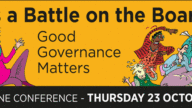What Makes a Great Trustee? 5 Traits You Should Be Developing
Ben Wittenberg, Director of Development and Delivery at DSC, gives you some great tips on traits you should be developing to be a great trustee.
As a charity trustee it can sometimes feel like you’re there to be an expert. That your role is to impart wisdom, share your expertise, and have answers to all of the big questions – especially when you’ve been recruited on the basis of specific professional skills or experience.
But what actually makes a great trustee? Spoiler: it’s not simply being an expert in your field, or knowing every single thing about your beneficiaries or cause. The best trustees develop a knack for working at the right strategic level, giving their executive team wings (instead of headaches), and making board meetings something people don’t dread.
Here are five traits every board member should cultivate…
1. Big-Picture Thinking (with Optional Binoculars)
A great trustee should be thinking from a great height: more focused on spotting trends or far off dangers than getting tangled in the weeds. Boards do their finest work by setting direction, reviewing strategy, and asking “are we making a difference?”—not by picking napkin colours for the AGM or re-writing the staff handbook for the umpteenth time.
So when your CEO proposes a brave new fundraising strategy. Instead of obsessing over which colour font is used in the pamphlet, ask: “How will this help us reach more beneficiaries…and how will we know?”
2. Supportive Curiosity (Being Helpfully Nosy)
Trustees should be curious—about impact, finances, opportunities, and risks—but always with the aim of being helpful, not obstructive. Imagine yourself as the favourite (read: less-annoying) relative at Christmas dinner: probing, but never interrogating; supportive, but not hovering.
So when your Head of Programmes shares that an initiative is running behind. Instead of bringing out the verbal flamethrower, you ask, “How can we as trustees help unblock things, or adapt our expectations?”
3. Healthy Challenge (Preferably Minus the Drama)
Nobody benefits from boards where everyone just nods along. A great trustee asks the awkward questions—but in a way that helps the exec learn and grow, not want to join a witness protection scheme. It’s about challenging ideas, not individuals, and knowing when to let things drop – especially the things you are passionate about that (if you’re honest with yourself) are not strategically important.
When a decision looms, don’t dive into how you would do it differently, say, “That’s an interesting approach—what risks have we considered, and how will we monitor progress?” Cue supportive debate that encourages different views and input.
4. Relationship Building (Bring Biscuits…Metaphorically or Otherwise)
Productive boards are built on trust and relationships. This means investing time to get to know your fellow trustees and exec team outside the boardroom. And, shock horror, it means disagreeing sometimes—respectfully. That’s so much easier when there’s a solid relationship and you understand each other’s motivations, tendencies and preferred ways of communicating.
Time together is critical for building relationships, so why not arrange 121s with you fellow trustees once a year, and always arrive early for meetings and plan to not have to dash off straight away afterwards, and you’ll be amazed how quickly you get to know your fellow trustees better in those tiny chunks of time.
5. Knowing When to Let Go (The Anti-Helicopter Approach)
The greatest gift a trustee board can give its exec team is trust—backed up by the right level of scrutiny, of course. Once decisions are made, step back and let your team deliver. If you find yourself wanting to micro-manage, it’s time for a cup of tea and a re-read of the governance code.
So when you’ve agreed on next year’s budget, instead of checking every purchase order, stay focused on outcomes—and show you’ve got the team’s back (not looking over their shoulder).
In Summary…
Being a great trustee isn’t about being the expert, or always having the right answer—it’s about keeping things strategic, bringing challenge with kindness, supporting your team, and making the boardroom a place for positive, purposeful work. That’s what makes the difference, and why your charity (and your team) needs you at your best.
So, next time you’re prepping for a meeting, pack your big-picture mindset, your best questions, and plan to spend some time chatting with your fellow trustees outside of the agenda.
If you and your fellow trustees want to boost your individual and collective effectiveness, and play an even more positive role in the work your charity is delivering, attend DSC’s amazing governance conference It’s a Battle on the Board: Good Governance Matters conference online on Thursday 23 October.

